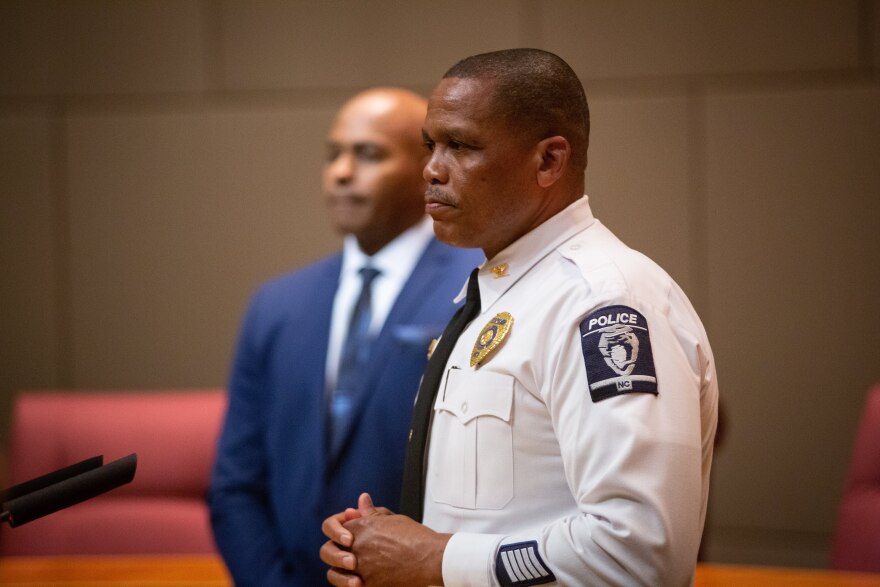Charlotte-Mecklenburg Police Chief Johnny Jennings met with reporters Wednesday to discuss body-worn camera footage released last week.
The footage was from the night of June 2. That was the fifth night of protests in uptown in the wake of George Floyd’s death in Minneapolis.
In one of the videos released, a CMPD sergeant is heard describing to another officer the plan to tear gas protesters.
Facebook Live video from Queen City Nerve that night showed protesters seemingly trapped by tear gas deployed by police.
WFAE's Sarah Delia spoke with Jennings about the footage, as well as the mass shooting that occurred in late June on Beatties Ford Road.
Sarah Delia: It's been almost a week since the CMPD footage was released from June 2. What are your reflections after all the feedback that you've gotten about the release of that footage a week out?
Johnny Jennings: Well, you know, it just reaffirms what we've been saying from Day 1 is that we realized that there were mistakes made. There were things that we don't ever want to repeat again within CMPD. And a lot of those things, although those tactics and the distribution of riot control agents were within policy at that point, we were very clear that we don't want to ever see this happen again, and we've taken measures to make sure that it doesn't.
Delia: Queen City Nerve has released the name of the sergeant that they say was involved in that video in particular that circulated. Are you all able to confirm that Scott Sherwood was the sergeant in that video?
Jennings: Well, I can't comment on that. State law prohibits me from doing that. And, you know, Queen City Nerve, they have their sources that they've indicated. I can't tell them that they can't put it out because it's not a violation of law for them to put it out. However, what I can say is I can't confirm or deny that that information is accurate.
Delia: OK. When you saw that they had released that information, did you have a reaction to that?
Jennings: My concern is for the officers. I mean, I think you have to be very careful when you release information because you're dealing with the safety of the officers. And if it's inaccurate, then then we have another issue where we're having to make sure that those officers are safe in their homes, their families are safe. So I think you really have to be careful when you start naming officers in incidents like this, because there's a lot of emotions out there and we have to be able to quell that as much as possible.
Delia: Some people have said that this sergeant in particular is kind of falling on the sword for other maybe poor behavior that just wasn't recorded or heard by the public. What's your reaction to that?
Jennings: Well, the officer that was disciplined under this absolutely is ... I feel like it's very much appropriate because our disciplinary philosophy, we look at the degree of harm. How much more degree of harm (is there) than losing trust in our community? And, you know, we look at the June 2 incident and it seems that every time I'm in front of a camera or a microphone, I'm speaking about the sergeant's comments. So I feel like it was appropriate. We don't operate in the sense of scapegoats when it comes to corrective action for officers. So, people will always say that. However, we look at each case individually based on the merits of that case.
Delia: I also wanted to just ask real quick, as far as an update on the Beatties Ford Road shootings. I mean, it's been two months. People are wondering, has this gone away? Is this not in the forefront of the department's attention anymore? What's your response?
Jennings: That's a very good question, because I do get asked that within the communities. But all I can say at this point, and because of the integrity of the investigation -- which is going to be prolonged -- is that our detectives are working very hard. They're moving forward. They're having to piece all the evidence together with the suspect information. So they're making progress. It's going to be long term. Of course, it would always be shorter if we had witnesses that would actually come forward. But we also understand that there is a fear factor because there are some pretty bad people out there that have no regard for human life. And we have to make sure we're rock-solid in our investigation.
Delia: OK, so no timeline as to when we might have an update?
Jennings: I wish I could put a timeline on it, but unfortunately, these investigations sometimes take a very long period of time because you want to make sure you get everyone, and you want to make sure you're thorough so that the case when presented to the district attorney is solid.
Want to read all of WFAE’s best news each day? Sign up for our daily newsletter, The Frequency, to have our top stories delivered straight to your inbox.








